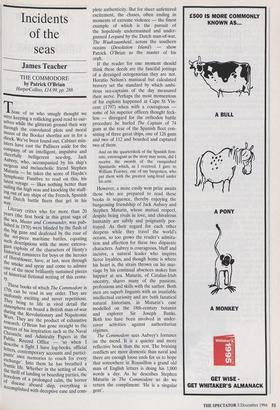Incidents of the seas
James Teacher
THE COMMODORE by Patrick O'Brian HatperCollins, £14.99, pp. 288 "hose of us who smugly thought we Were keeping a rollicking good read to our- selves while the glitterati ground their way through the convoluted plots and moral mazes of the Booker shortlist are in for a shock. We've been found out. Cabinet min- isters have cast the Pallisers aside for the company of an intelligent, impulsive and cheerfully belligerent sea-dog, Jack Aubrey, who, accompanied by his ship's surgeon and melancholic friend Stephen Maturin — he takes the score of Haydn's SYmphonie Funebre to read on this, his latest voyage — likes nothing better than sailing the high seas and knocking the stuff- ing out of any ships of the French, Spanish and Dutch battle fleets that get in his way, Literary critics who for more than 20 Years (the first book in this great saga of the sea, Master and Commander, was pub- lished in 1970) were blinded by the flash of the big guns and deafened by the roar of the set-piece maritime battles, equating such descriptions with the more extrava- gant exploits of the characters of Henty's tristorical romances for boys or the heroics Of norriblower, have, at last, seen through the smoke and spray and come to admire °fie of the most brilliantly sustained pieces of historical fictional writing of this centu- TY.
These books of which The Commodore is 17th can be read in any order. They are 7,1111,if°rinly exciting and never repetitious. They bring to life in vivid detail the atmosphere on board a British man-of-war _daring the Revolutionary and Napoleonic Wars. They are the product of exhaustive research. O'Brian has gone straight to the sources of his inspiration such as the Naval Chronicle and Admiralty Papers in the Public Record Office — 'so when I idescribe a fight I have log-books, official etters, contemporary accounts and partici- pants own memories to vouch for every e_xchange'. Into them he has breathed a frantic life. Whether in the setting of sails, ,the thrill of landing or boarding parties, the boredom of a prolonged calm, the horror of disease aboard ship, everything is accomplished with deceptive ease and com- plete authenticity. But for sheer unfettered excitement, the chases, often ending in moments of extreme violence — the finest example of which is the pursuit of the hopelessly undermanned and under- gunned Leopard by the Dutch man-of-war, The Waalczaamheid, across the southern oceans (Desolation Island) — show Patrick O'Brian as the master of his craft.
If the reader for one moment should think these deeds are the fanciful jottings of a deranged octogenarian they are not. Horatio Nelson's maniacal but calculated bravery set the standard by which ambi- tious sea-captains of the day measured their nerve. Perhaps the most momentous of his exploits happened at Cape St Vin- cent (1797) when with a courageous — some of his superior officers thought feck- less — disregard for the orthodox battle procedure he hurled The Captain of 74 guns at the rear of the Spanish fleet con- sisting of three great ships, one of 126 guns and two of 112 and boarded and captured two of them.
And on the quarterdeck of the Spanish first- rate, extravagant as the story may seem, did I receive the swords of the vanquished Spaniards: which, as I received, I gave to William Fearney, one of my bargemen, who put them with the greatest sang-froid under his arm.
However, a more easily won prize awaits those who are prepared to read these books in sequence, thereby enjoying the burgeoning friendship of Jack Aubrey and Stephen Maturin, whose mutual respect, despite being rivals in love, and chivalrous humanity are subtly and poignantly por- trayed. As their regard for each other deepens while they travel the world's oceans, so too grows the reader's admira- tion and affection for these two disparate characters. Aubrey is courageous, bluff and incisive, a natural leader who inspires fierce loyalties, and though home is where his heart is, the strain thrown on his mar- riage by his continual absences makes him happier at sea. Maturin, of Catalan-Irish ancestry, shares many of the passions, professions and skills with the author. Both men are superb linguists with an insatiable intellectual curiosity and are both fanatical natural historians, in Maturin's case modelled on the 18th-century botanist and explorer Sir Joseph Banks. Both too have been involved in under- cover activities against authoritarian regimes.
The Commodore sees Aubrey's fortunes on the mend. It is a quieter and more reflective book than the rest. The bruising conflicts are more domestic than naval and there are enough loose ends for us to hope that somewhere in Roussillon a grand old man of English letters is doing his 1,000 words a day. As he describes Stephen Maturin in The Commodore so do we return the compliment: 'He is a singular gent'.










































































 Previous page
Previous page